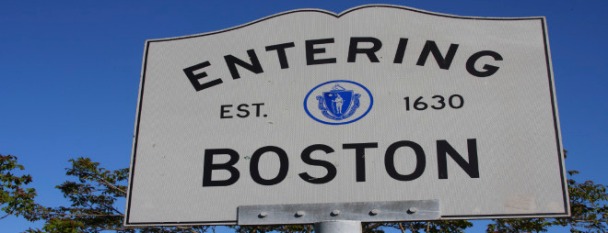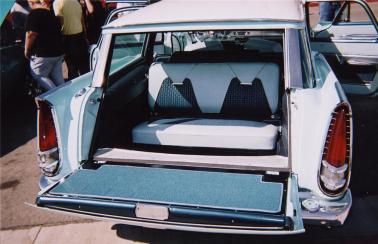
The station wagon with the third seat facing the rear pulled into Boston. My two younger brothers and I rode that seat from California to Massachusetts, watching where we’d been, rather than where we were going.
3,177 miles backwards. For a while I was dizzy, car sick, nauseous, but after a while I got used to it.
 The ’59 Dodge was a big car. It seemed like Mom and Dad, and whoever else was sitting up front with them, were in a different county. The actual dimensions of this monstrous car? Just over eighteen feet long, six-and-a-half feet wide, weighing about 4,200 pounds. The advertised top speed was 120 MPH, but I never saw my parents drive faster than 115. Mom liked to drive fast. I remember my turn to sit up front and help her “stay awake” one night driving through the Arizona desert while Dad got some sleep. It was scary.
The ’59 Dodge was a big car. It seemed like Mom and Dad, and whoever else was sitting up front with them, were in a different county. The actual dimensions of this monstrous car? Just over eighteen feet long, six-and-a-half feet wide, weighing about 4,200 pounds. The advertised top speed was 120 MPH, but I never saw my parents drive faster than 115. Mom liked to drive fast. I remember my turn to sit up front and help her “stay awake” one night driving through the Arizona desert while Dad got some sleep. It was scary.
We got about nine miles per gallon if one or two people were in the car. Seven or eight miles a gallon when all ten of us went somewhere together, like we did on this cross-country trip. Nobody had seat belts back then.
As we pulled up to a traffic light in this strange city far from home, suddenly, my dad was yelling and talking excitedly. Someone outside was shouting and talking just as fast. From way back in the third row, I tried to see what was going on. Were my dad and the stranger mad at each other? Why were they yelling? I looked out the side window of our car and saw that the driver of the car next to us had dark skin and black curly hair. Why was he yelling at my dad? And why was my dad yelling back at him?
At first, it seemed they were angry with each other. But no, they weren’t upset. Rather they were excited and happy. They were yelling for joy. But why?
As I kept on looking at the man in the car next to us, I glanced down to see the license plate on his car. We had played the license plate game all across the country: keep track of all the license plates, and see who gets the most states. There were a lot of variations to that game; you’ve probably played something similar.
Riding backwards made it easier if the cars catching up to us had front license plates, because looking backwards I could see them before my brothers and sisters in the middle seat could see them. But if we were passing the other cars, then they got to see the license plates first. The way my parents drove, nobody ever passed us, so I never won the game.
 At the red light in Boston, the license plate on the car next to us looked familiar. Was it? Yes! It was orange and black, a California license plate! We hadn’t seen one of those since we left home. Was that why Dad and the other guy were hollering? Yep, sure was.
At the red light in Boston, the license plate on the car next to us looked familiar. Was it? Yes! It was orange and black, a California license plate! We hadn’t seen one of those since we left home. Was that why Dad and the other guy were hollering? Yep, sure was.
There we were, our first day in Boston. We didn’t know a single soul in the city, or in the entire state of Massachusetts. But that first traffic light we stopped at in Boston placed us right next to another human being from California. It was his first day in Boston too.
My first memory of encountering an African-American, and the thing that stuck in my mind more than anything else was the connection that he and my dad made with each other. It wasn’t age; my dad was forty-two and the other guy seemed to be younger. It wasn’t family circumstance; my dad had a wife and eight kids in the car, while the other guy was single. It wasn’t that they had similar careers; my dad was in the Navy, and the other guy worked in a factory. And it wasn’t that they looked alike; my dad was a balding white guy, and the other guy was black with a full afro.
No, the connection they made with each other was simply that they had something in common. They were both from California, and that was enough. They were both more than 3,000 miles from home, and friendless – until that moment. They found someone from home.
I often think about that experience. Why is it that people who are different despise each other? Why do people of different skin color or different nationality or different language or different gender or different religion or different political party or different socioeconomic standing hate each other? Why can’t we do what my dad and the stranger did in Boston that day in 1962?
I was seven years old when we drove into Boston. Over the past fifty-plus years, I’ve tried to focus on what I have in common with other people, instead of our differences: marriage, kids, jobs, sports, music, food, weather, fears, dreams, movies, faith, or our human-ness. There’s so much we share, it’s a shame people choose to fight over their differences.
Something powerful and amazing happens when we connect over something we have in common.


What a memory! I greatly enjoyed that story.
LikeLike